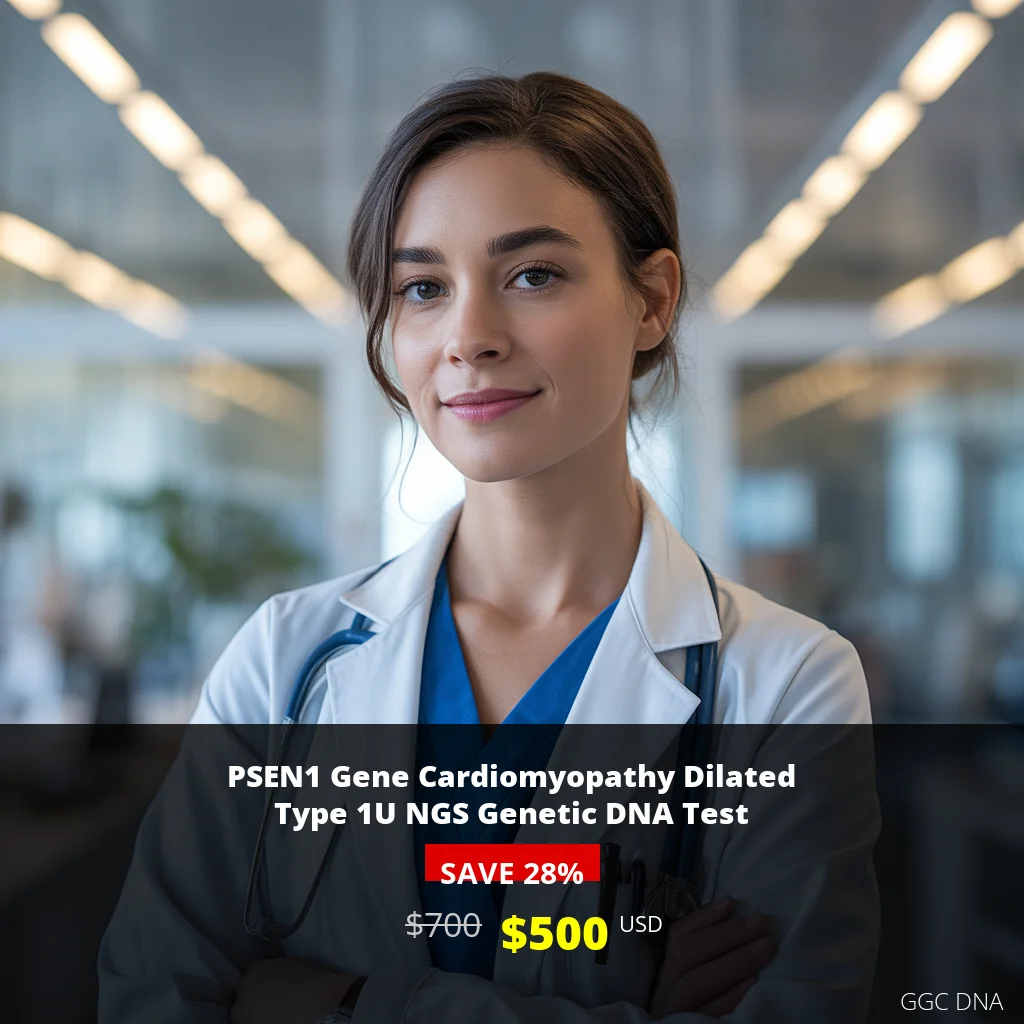PSEN1 Gene Cardiomyopathy Dilated Type 1U NGS Genetic DNA Test
Comprehensive Introduction to PSEN1 Genetic Testing
The PSEN1 Gene Cardiomyopathy Dilated Type 1U NGS Genetic DNA Test represents a breakthrough in cardiac genetic diagnostics, offering precise detection of mutations in the PSEN1 gene that cause dilated cardiomyopathy type 1U. This inherited condition affects the heart’s ability to pump blood effectively, leading to progressive heart failure if left undetected. Our advanced next-generation sequencing technology provides unparalleled accuracy in identifying genetic variants that traditional testing methods might miss.
Early identification of PSEN1 gene mutations is crucial for implementing preventive measures and personalized treatment strategies. This test serves as a vital tool for families with hereditary cardiac conditions, enabling proactive healthcare decisions and informed family planning. The comprehensive nature of our NGS approach ensures thorough analysis of the PSEN1 gene, providing patients and healthcare providers with reliable genetic information for clinical management.
What This Test Measures and Detects
The PSEN1 Gene Cardiomyopathy Dilated Type 1U NGS Genetic DNA Test specifically analyzes:
- Complete sequencing of the PSEN1 gene for pathogenic variants
- Detection of known mutations associated with dilated cardiomyopathy type 1U
- Identification of novel genetic variants with potential clinical significance
- Assessment of mutation inheritance patterns within families
- Evaluation of genetic risk factors for progressive cardiac dysfunction
Our state-of-the-art NGS technology examines the entire coding region of the PSEN1 gene, including intron-exon boundaries and regulatory regions. This comprehensive approach ensures maximum detection sensitivity for both common and rare genetic variants that contribute to dilated cardiomyopathy development.
Who Should Consider PSEN1 Genetic Testing
Clinical Indications and Symptoms
This genetic test is particularly recommended for individuals experiencing:
- Unexplained shortness of breath or fatigue during routine activities
- Family history of dilated cardiomyopathy or sudden cardiac death
- Abnormal heart rhythms or palpitations without clear cause
- Progressive heart enlargement detected through imaging studies
- Reduced cardiac ejection fraction without coronary artery disease
- Planning pregnancy with family history of cardiac conditions
- Unexplained syncope or fainting episodes
High-Risk Populations
- Individuals with first-degree relatives diagnosed with dilated cardiomyopathy
- Patients with early-onset cardiac symptoms before age 50
- Those with multiple family members affected by heart failure
- Individuals from ethnic backgrounds with higher prevalence of cardiac genetic disorders
Significant Benefits of PSEN1 Genetic Testing
Undergoing PSEN1 genetic testing provides numerous advantages for patients and their families:
- Early Risk Identification: Detect genetic predisposition before symptom onset
- Personalized Treatment Planning: Tailor cardiac medications and interventions based on genetic profile
- Family Screening Guidance: Identify at-risk relatives who may benefit from monitoring
- Reproductive Planning: Make informed decisions about family expansion with genetic counseling
- Proactive Monitoring: Implement regular cardiac surveillance for mutation carriers
- Psychological Relief: Reduce uncertainty through definitive genetic information
- Clinical Trial Eligibility: Access to emerging therapies for specific genetic subtypes
Understanding Your Test Results
Result Interpretation Framework
Your PSEN1 genetic test results will fall into one of several categories, each with specific clinical implications:
Positive Result
A positive result indicates the presence of a known pathogenic mutation in the PSEN1 gene. This confirms genetic predisposition to dilated cardiomyopathy type 1U and warrants:
- Regular cardiac monitoring with echocardiograms and ECGs
- Consultation with a cardiologist specializing in genetic heart conditions
- Family member testing and genetic counseling
- Implementation of preventive lifestyle modifications
Negative Result
A negative result suggests no pathogenic PSEN1 mutations were detected. However, this doesn’t completely eliminate cardiac risk, as:
- Other genetic or environmental factors may contribute to cardiac conditions
- Rare variants of uncertain significance may require additional evaluation
- Continued cardiac monitoring may be recommended based on clinical presentation
Variant of Uncertain Significance (VUS)
Some genetic changes have unclear clinical implications. In such cases:
- Ongoing research may provide future clarity
- Clinical correlation with symptoms and family history is essential
- Periodic re-evaluation of variant classification is recommended
Test Pricing and Details
| Price Type | Amount (USD) |
|---|---|
| Discount Price | $500 |
| Regular Price | $700 |
Additional Test Information
- Turnaround Time: 3 to 4 Weeks
- Sample Type: Blood, Extracted DNA, or One Drop Blood on FTA Card
- Methodology: Next-Generation Sequencing (NGS) Technology
- Specialty: Cardiology and Genetics
- Disease Category: Cardiovascular Disorders
Pre-Test Requirements
Before testing, we recommend:
- Comprehensive clinical history documentation
- Genetic counseling session to create detailed family pedigree
- Discussion of testing implications with healthcare provider
- Informed consent process understanding benefits and limitations
Nationwide Testing Availability
We proudly offer PSEN1 genetic testing services across the United States, with convenient locations in major metropolitan areas including New York, Los Angeles, Chicago, Houston, Phoenix, Philadelphia, San Antonio, San Diego, Dallas, and San Jose. Our network of certified genetic counselors and cardiology specialists ensures comprehensive care coordination regardless of your location.
Take Control of Your Cardiac Health Today
Don’t let genetic uncertainty impact your heart health decisions. Our PSEN1 Gene Cardiomyopathy Dilated Type 1U NGS Genetic DNA Test provides the clarity needed for informed medical management and family planning. With our discounted price of $500 USD and comprehensive genetic counseling support, you can access cutting-edge cardiac genetic testing without financial burden.
Ready to schedule your genetic test? Contact our genetic specialists today at +1(267) 388-9828 or book your appointment online. Our team is available to answer your questions, discuss insurance coverage options, and guide you through the testing process with compassion and expertise.
Take the first step toward understanding your genetic cardiac risk and protecting your heart health for years to come. Early detection through genetic testing can make a significant difference in treatment outcomes and quality of life.







